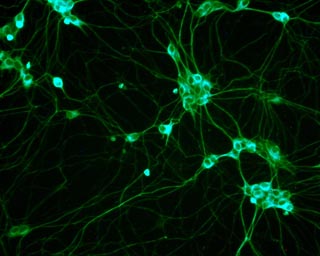Sept. 19, 2005
U-M launches center for stem cell biology
ANN ARBOR, Mich.—President Mary Sue Coleman today announced a significant expansion of the University of Michigan’s efforts in stem cell science with the creation of a new interdisciplinary center for stem cell research, to be based at the Life Sciences Institute.
"Stem cell science is one of the most important areas in biomedical research today," Coleman said. "It has already yielded key insights into the elusive biology of human development and has great potential for increasing our understanding of devastating human diseases like diabetes, cancer, Parkinson’s disease and other neurodegenerative diseases."
The center for stem cell biology will be established with $10.5 million in funding provided by the U-M Medical School, the Life Sciences Institute and the Molecular and Behavioral Neuroscience Institute (MBNI). Under the leadership of noted stem cell scientist Sean Morrison, the center will recruit up to seven faculty whose laboratories will be located in the LSI, the Medical School or in MBNI. The U-M stem cell center will emphasize using stem cell science to answer the most pressing questions of fundamental human biology, such as how specific tissues in the body are formed and how cells communicate with one another.
 |
Morrison
(click image for hi res) |
"Our commitment to follow the science where it leads is Michigan's historic strength and research signature," Coleman said. "As a world scientific leader, U-M is vigorously pursuing this promising area of discovery."
U-M scientists have made notable advances in many areas of stem cell science, especially involving tissue-specific and cancer stem cells. The U-M Medical School is home to one of only three NIH-funded human embryonic stem cell research centers in the United States. The new center will expand current areas of research strength by using stem cells to pursue basic biological questions.
"We believe the new center for stem cell biology will serve as a research hub leading to increased communication and collaboration among all U-M scientists working in this dynamic field of scientific inquiry," said Dr. Allen S. Lichter, dean of the U-M Medical School. "Medical School scientists—many of whom will be located in our new Biomedical Sciences Research Building just across the street from the Life Sciences Institute—will be in a perfect position to work closely with LSI researchers. The opportunity to interact and share expertise and technical resources will be an enormous benefit to everyone involved."
The center’s director, Sean Morrison, is associate professor of internal medicine in the Medical School and a Howard Hughes Medical Institute investigator. Morrison’s research focuses on blood-forming (or hematopoietic) stem cells that give rise to all blood and immune system cells and on neural crest stem cells that give rise to the peripheral nervous system. In looking at the fundamental biology of stem cells, the center will examine such phenomena as the remarkable ability of stem cells to replicate themselves indefinitely, which could provide insight into how cancer cells can do the same thing.
The Morrison laboratory has published several important advances in stem cell biology in recent years. They showed for the first time that stem cells persist throughout adult life in the peripheral nervous system, a discovery that could lead to new treatments for nervous system injuries. They discovered mechanisms that regulate the maintenance of adult stem cells throughout life, an insight that could have implications for regenerative medicine and cancer. Most recently, they discovered new markers that enhance the purification of blood-forming stem cells, an advance that could lead to safer and more effective bone marrow transplants. Morrison was honored with the Presidential Early Career Award for Scientists and Engineers in 2003.
"The University-wide commitment to create and support this new research center is a tangible sign of the importance the U-M places on this rapidly developing area of science," Morrison said. "The more we learn about the fundamental biology of stem cells, the greater the potential for advances in biomedical research and medicine. Bringing scientists from many disciplines together to focus on important questions in stem cell biology is the best way to speed the pace of discovery."
Morrison is moving his laboratory to the LSI and will lead recruiting for the new faculty who will hold joint appointments in many different U-M life science departments. The new center will also encompass key core facilities used in stem cell research. Close interactions are expected with the U-M Comprehensive Cancer Center.
"Stem cell biology is an important area of research, and it is the basic science that holds great promise," said Alan Saltiel, director of LSI. "We are in the midst of revolutionary change in health care that starts with life sciences research and progresses through to new treatments for things like cancer, diabetes, and heart disease. The key of the center is knowledge-building and collaboration—bringing the best scientists together from multiple disciplines to shed light on these big problems."
Faculty recruiting to the new center will be underway this fall. Pending approval of U-M’s Board of Regents, Morrison will be appointed the Henry Sewall Professor in Medicine and will also hold the title of research associate professor in the Life Sciences Institute.
Related links:
Sean Morrison http://www.hhmi.org/research/investigators/morrison_bio.html
Life Sciences Institute (LSI) http://www.lsi.umich.edu/institute/
U-M Medical School -http://www.med.umich.edu/medschool/
The Molecular & Behavioral Neuroscience Institute (MBNI) http://www.mbni.med.umich.edu/mbni/
U-M Cancer Center http://www.cancer.med.umich.edu/
Releases on Morrison’s work:
U-M scientists discover identifying markers that change as primitive blood-forming stem cells morph into progenitor cells
U-M scientists find genetic "fountain of youth" for adult stem cells
Stem cells found in adult peripheral nervous system
Contact: Robin Stephenson
Phone: (734) 615-9390
or
Contact: Karl Bates
Phone: (734) 647-1842
|



